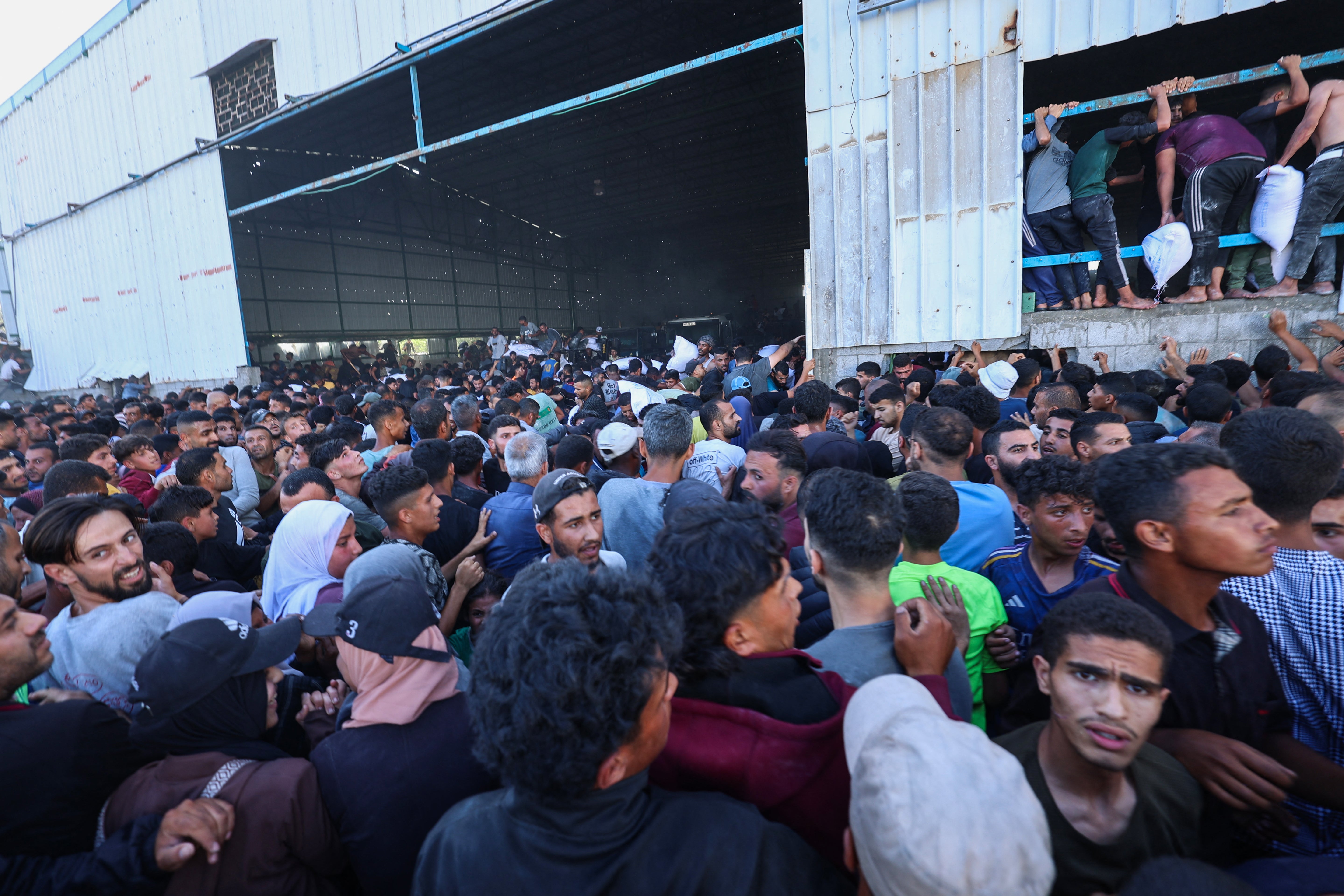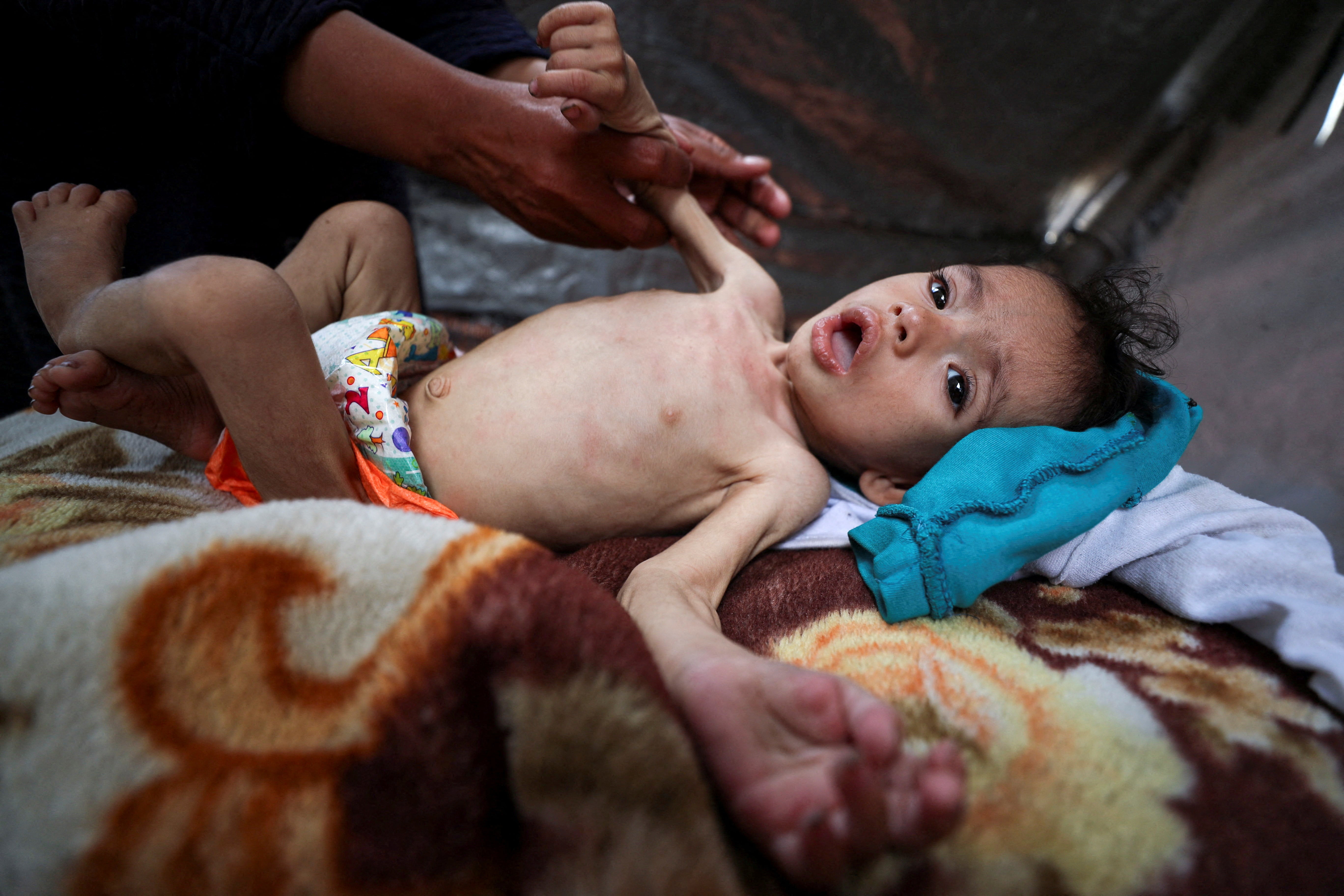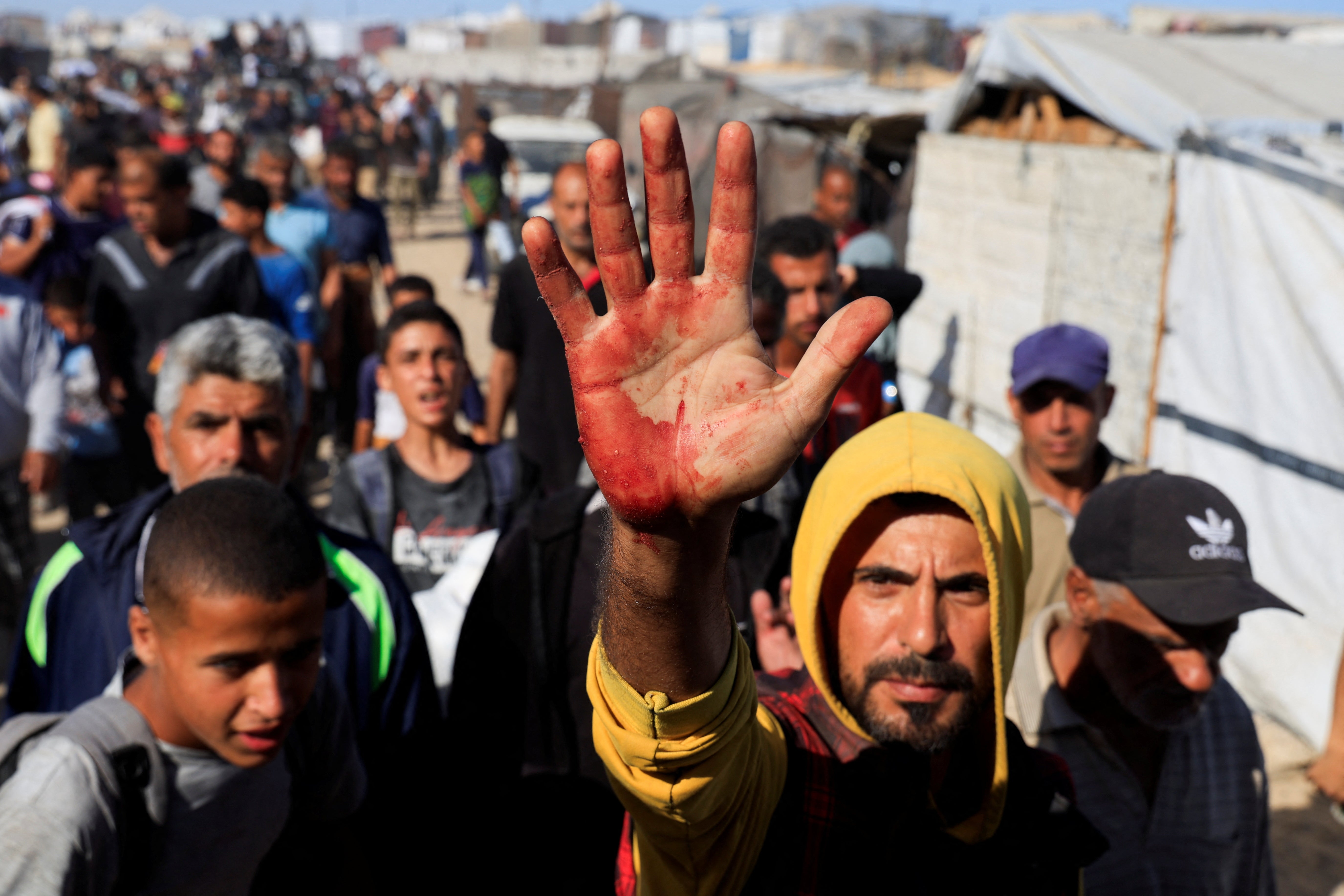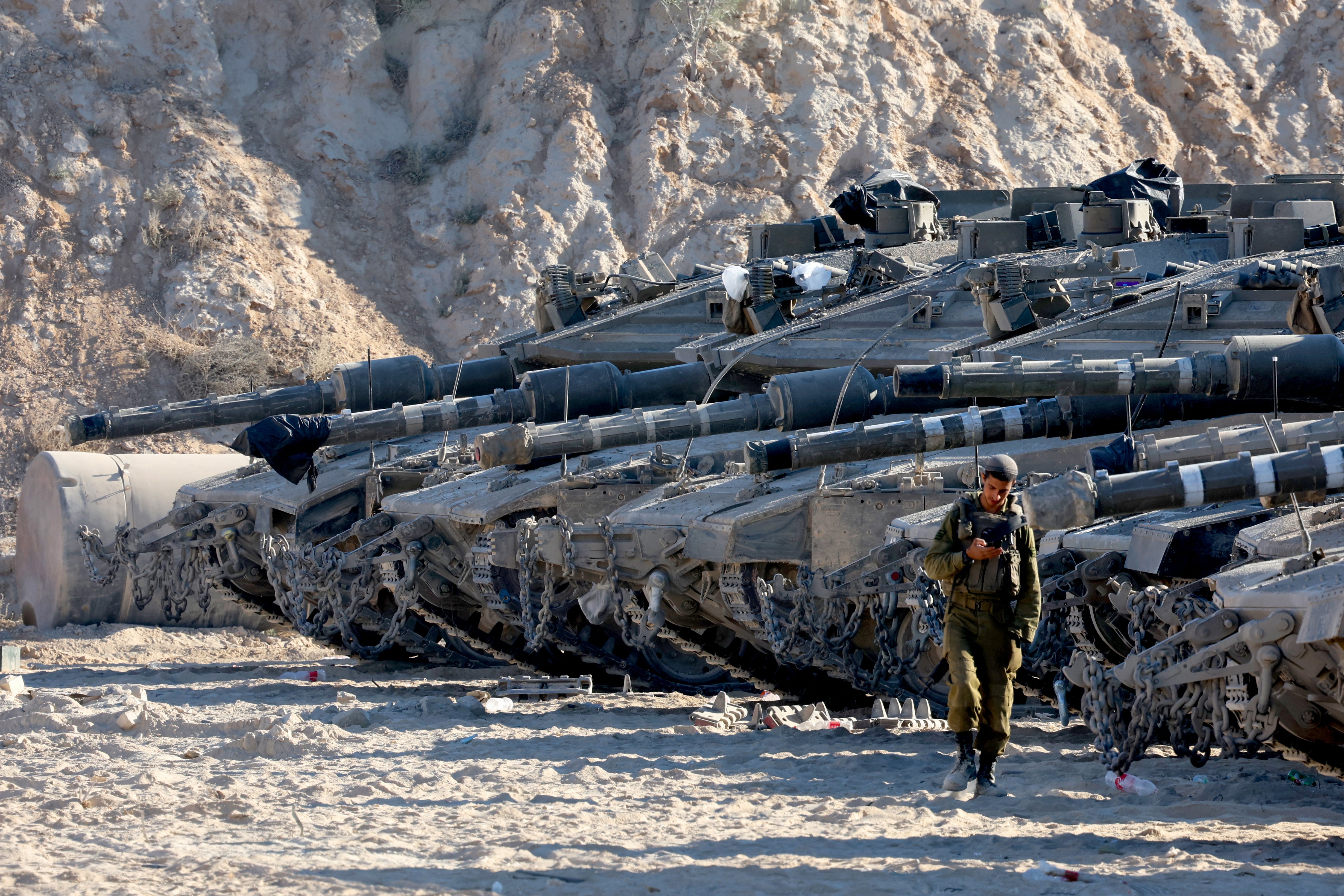Starving Palestinians desperate for food say Israeli helicopter gunships and tanks fired around crowds gathered at a new food distribution site in Gaza, as Benjamin Netanyahu’s controversial “aid” plan descended into chaos.
Gaza’s health ministry said at least one person was killed and 48 wounded in violence on Tuesday when desperate crowds overran the site in Rafah, south of the besieged strip. It was set up by a US-backed foundation, military contractors and the Israeli military whose soldiers reportedly opened fire.
Hospital officials said that four people died in a separate stampede on Wednesday when hundreds of Palestinians stormed a United Nations food warehouse in an equally desperate attempt to find food.
On Thursday, Israel's government approved 22 new Jewish settlements in the occupied West Bank – illegal under international law – in a move that will deepen divisions with some allies, including the UK. On Friday, hopes of a ceasefire were again dashed when Hamas said a US plan backed by Israel failed to meet its demands.

Meanwhile, Palestinians on the ground continue to suffer, with a warning that millions are now at risk of famine.
Ahmed Shaker, 30, described the chaos in Rafah on Tuesday as he tried to get food for his family.
“Because of the large number of people, they collided with each other,” he said. “The intensity of the stampede increased until the fence separating the barriers collapsed. A quadcopter came and started firing around us.”
The father-of-three’s home was destroyed in the bombings. He has been displaced four times and was trying to get food for his one-year-old baby and two toddler daughters.
“Then the tank approached and started firing near the people,” he continued. “The bullets were hitting the sand. Then the Apache helicopter came and fired toward the sea.”
“My children’s hunger drove me to go. It's been more than a month and a half since I’ve eaten bread, except for a few small pieces. I was determined to go so I could feed my children and spare them from starvation,” he added.

Khairiya, 64, told The Independent she walked several kilometres on foot to get to the distribution site, from the tent where she now lives after being displaced seven times. But the place became crowded. “There was no more control,” the mother-of-seven said, adding that the Israeli army started shooting from quadcopters and tanks.
“My husband is 71 and has difficulty moving, especially when walking and carrying the aid box,” she explained. “My eldest son told me not to go, but I went because we had little food. Unfortunately, I was not lucky enough to get the aid.
“Some were able to get aid, and many did not. The distribution site is in the middle of sand dunes, up and down. Despite the difficulty, I will go again after the next delivery is announced. I haven’t had bread for two weeks,” she added.
The Israeli military says it guards the site from a distance, and that it fired only warning shots to control the situation. The US-based and backed Gaza Humanitarian Foundation said its security contractors manning the site said it did not open fire and that distribution continued without incident shortly afterwards. It told Israeli media it plans to open four sites and expand operations in Gaza in the coming weeks.

However, a Red Cross field hospital reported that the 48 wounded people had suffered gunshot injuries, including women and children.
Israel has faced ferocious criticism from its allies, including the UK, which this month sanctioned Israeli settlers and organisations and froze free trade talks over its three-month blockade on Gaza. The entire 2.3 million strong population is now at risk of famine, according to a United Nations global hunger monitor.
And so under intense international pressure, Israel ended the 11-week-long aid blockade last week. It has now allowed limited relief through a heavily criticised plan to corral the population into areas with feeding points, like the site in Rafah which was opened on Monday.
The United Nations and other humanitarian organisations have rejected the new aid system, arguing there is no way it can meet Gaza’s overwhelming need and that it allows Israel to use food as a means of population control. They have also warned of the risk of friction between Israeli troops and civilians seeking supplies and continue to call for an immediate ceasefire and unrestricted aid access.
UN agencies have reported that separately some aid deliveries resumed last week, with Israel approving about 800 truckloads of relief. But UN spokesperson Stephane Dujarric said that fewer than 500 truckloads made it to the Palestinian side of the Kerem Shalom crossing, “where we and our partners could collect just over 200 of them – limited by insecurity and restricted access”.
The UN Middle East envoy Sigrid Kaag told the Security Council on Wednesday that the amount of aid Israel had so far allowed the UN to deliver was “comparable to a lifeboat after the ship has sunk”, while everyone in Gaza remains at risk of famine.
Israel may face further sanctions as it separately approved 22 new Jewish settlements in the occupied West Bank, which are illegal under international law and widely seen as a major obstacle to long-term peace. Israeli finance minister Bezalel Smotrich, an ultra-nationalist minister who advocates for full Israeli sovereignty over the West Bank and for Gaza to be “totally destroyed”, said the new settlements would be in the northern part of West Bank but did not specify locations.
Israeli media citing the defence ministry said that among the new settlements, including existing “outposts” that are illegal under even Israeli law, would be legalised. A spokesperson for defence ministry did not respond to requests for comment on the announcement.
The Western-backed Palestinian Authority, which exercises limited rule in the West Bank, and Hamas militant group which runs Gaza, both condemned the Israeli decision.

Meanwhile, the Israeli military continued its ferocious offensive in Gaza, hitting dozens of targets overnight, including what it said were weapons storage sites, sniper positions, and tunnels. Palestinian medical workers said Israeli forces killed at least 45 people on Thursday, including 23 in a strike that hit several homes in the Bureij camp in central Gaza.
Mr Netanyahu said on Wednesday that Mohammed Sinwar, believed to be the head of Hamas' armed wing, has been killed, apparently confirming his death in a recent strike in the Gaza Strip. There was no confirmation from Hamas.
Despite the bombing and violence, families in Gaza returned to distribution points on Thursday, desperate for more food.
“Because of the blockade and high prices, everyone will go to receive aid. I met friends from all over the strip on the way back. I got a box that will last my family only five days,” said Fadi, 34, a computer engineer who has been displaced six times and whose house has been flattened.
“But this method is exhausting and humiliating. We were forced to go because of extreme hunger after 11 weeks of blockade. Also, it’s difficult for elderly people to walk kilometres and carry a box weighing more than 10 kilos.”
Israel ‘accepts’ US 60-day ceasefire plan but Hamas says it fails to end war
Hamas says US ceasefire plan accepted by Israel does not meet its demands
Iran calls Trump’s wish for deal that lets US ‘blow up’ nuclear sites a fantasy
Gaza ceasefire talks: What we know as Trump team eyes ‘peaceful resolution’
Four Palestinians killed as starving Gazans storm UN warehouse amid hunger crisis
Who is Mohammed Sinwar? The Hamas Gaza leader Israel claims it killed







